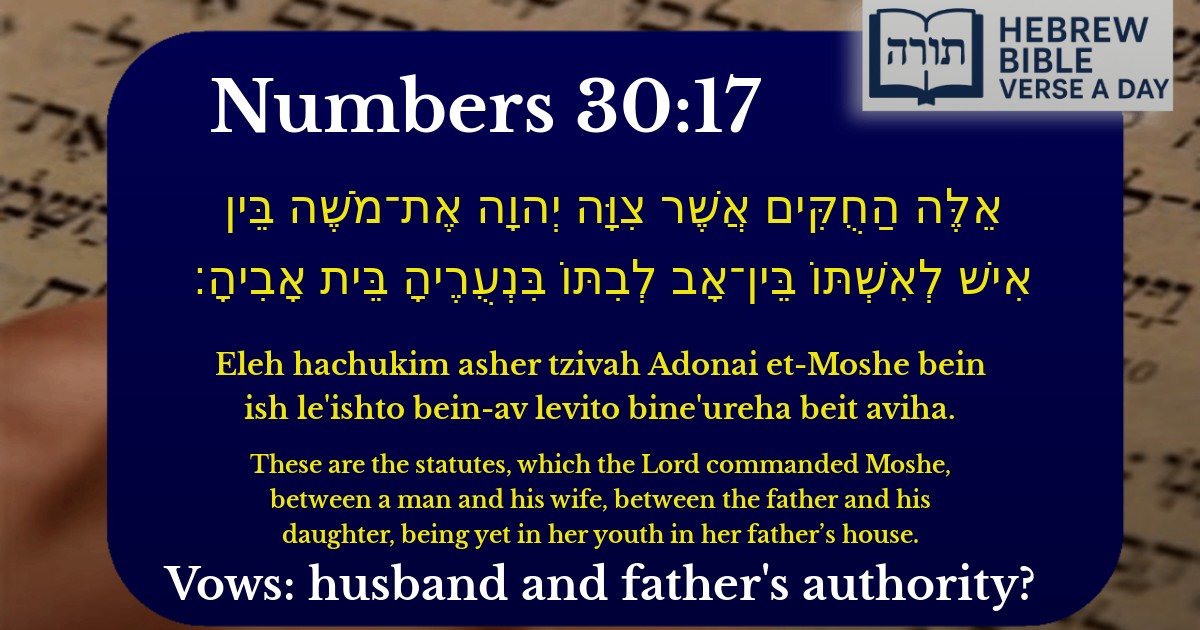Frequently Asked Questions
Q: What does Numbers 30:17 mean?
A: Numbers 30:17 concludes the section in the Torah discussing vows (nedarim) and oaths, emphasizing the laws regarding a husband's or father's authority to annul certain vows made by his wife or young daughter. The verse highlights that these statutes were commanded by Hashem to Moshe, focusing on family relationships—between husband and wife, and father and unmarried daughter living at home.
Q: Why is the father's role in annulling vows important?
A: According to Jewish law (based on this verse and Talmudic interpretation in Nedarim), a father has the authority to annul the vows of his unmarried daughter while she is still in his household ('in her youth'). This reflects the Torah's framework of parental responsibility and protection over children who are not yet independent. The Rambam (Hilchot Nedarim 12:1-2) explains this as a safeguard to prevent young people from making rash vows that may harm them.
Q: How does this verse apply to marriage?
A: The verse teaches that a husband also has limited authority (under specific conditions) to annul certain vows made by his wife, as derived from the phrase 'between a man and his wife.' The Talmud (Nedarim 70a-72a) details the circumstances—such as vows that affect marital relations or cause suffering. This highlights the Torah's emphasis on harmony and mutual respect in marriage.
Q: What can we learn from this verse today?
A: This verse reminds us of the Torah's careful balance between personal spiritual expression (making vows) and family unity. While vows are serious commitments (Kohelet 5:4), the Torah provides mechanisms—like annulment by a father or husband—to prevent unnecessary hardship. Today, this teaches the value of consulting wise authorities (like rabbis) before making binding oaths and considering how our commitments affect loved ones.
Q: Why does the Torah specify 'in her youth in her father’s house'?
A: Rashi explains that this phrase limits the father's authority to annul vows to the time when his daughter is still young and unmarried, living under his roof. Once she reaches adulthood (12.5 years old and shows signs of maturity) or marries, his authority ceases (unless she is a minor when married). This shows the Torah's precise delineation of responsibilities at different life stages (see Rambam, Hilchot Nedarim 11:1).


Context of the Verse
The verse appears in Bamidbar (Numbers) 30:17, concluding a section discussing the laws of vows (nedarim) and their annulment. The Torah specifies different scenarios where a father or husband may nullify a woman's vows under certain conditions, emphasizing the hierarchical relationships within the family structure as ordained by Halacha.
Explanation of Key Phrases
Halachic Implications
This verse establishes the framework for the annulment of vows, underscoring the roles of a father and husband in safeguarding the spiritual and domestic harmony of the family. The Mishnah (Nedarim 10:2) further distinguishes between vows that may be annulled (those affecting familial relationships) and those that may not (purely personal commitments).
Midrashic Insight
The Sifrei (Bamidbar 153) connects this verse to the broader theme of shalom bayit (domestic peace), teaching that Hashem prioritizes harmony between spouses and parents and children, even permitting the annulment of sacred vows to preserve familial unity.